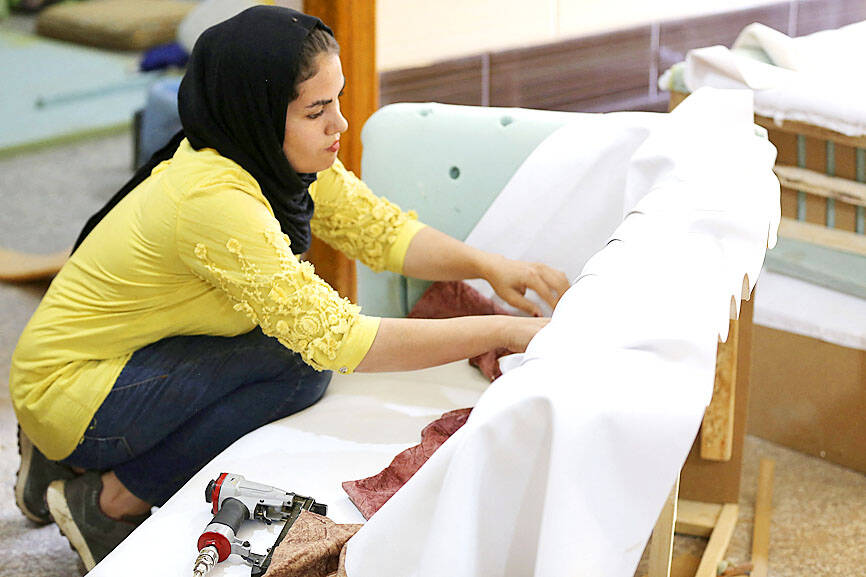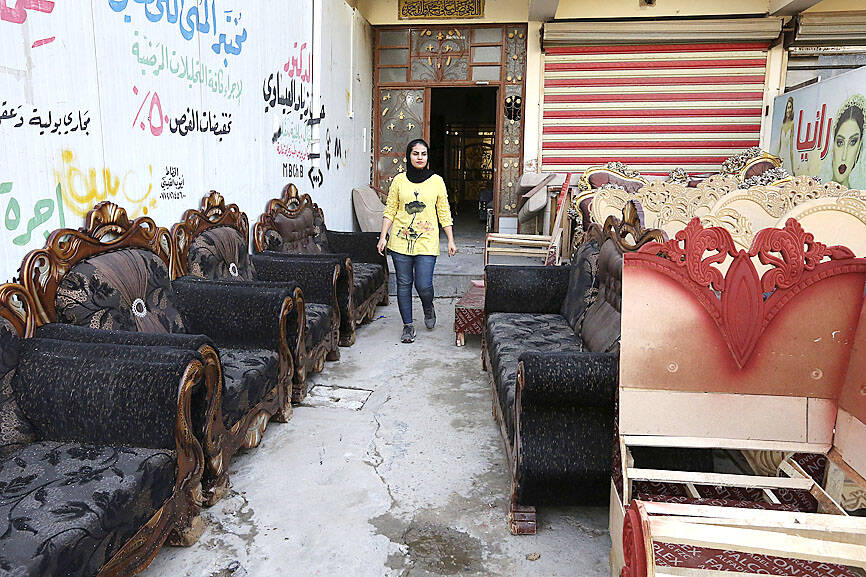With hammer and saw, Nour al-Janabi builds her latest creation, a candy-pink sofa, in the carpentry workshop she runs in male-dominated and conservative Iraq.
“At the start, relatives criticized me,” said the 29-year-old carpenter and furniture-maker, who is also a mother of four. “They would say: ‘But you’re a woman... You’re an amateur... It’s a men’s trade.’”
Covered in velvet or imitation leather, the sofas and armchairs that she designs, makes and mends in her south Baghdad workshop go from rustic style to Louis XV.

Photo: AFP
Her order book is full, with new lounges starting at a cool 700,000 dinars (US$479.29).
Al-Janabi has been making furniture for several years, and launched her business, Nour Carpentry, a few months ago. She recently moved operations from her home to a house turned workshop, where she has four employees — one of whom is her retired husband.
“But it’s not right to say it like that,” she said with an embarrassed smile, her hijab covering her hair.

Photo: AFP
In oil-rich Iraq, women make up just 13.3 percent of the labor force, World Bank data showed, while the World Economic Forum ranked the country 154 out of 156 in its latest Global Gender Gap Report.
A study published last year by two UN agencies said that while most Iraqis consider tertiary education equally important for men and women, “attitudes toward equal rights in employment are discriminatory against women.”
Al-Janabi attributes her success largely to do-it-yourself tutorials that she first posted on Facebook to share her passion for carpentry and furniture-making.
She uploads videos — about everything from how to re-stuff an old sofa to using a sander — to TikTok and Instagram, where she has more than 94,000 followers.
“I am the first Iraqi woman to do this trade and break the barrier in this field,” she said, in a country still largely dominated by conservative attitudes about women’s role in society, and where those perceived as too independent are sometimes even considered immoral.
She said she receives comments from women and men telling her: “You make Iraq proud and you have accomplished something.”
“May God give you strength and health,” one user commented on a video of al-Janabi presenting a sofa decorated with a floral pattern.
One of her clients, Abu Sajjad, dropped by to see how his sofa repairs were going — untroubled by prejudices some others might harbor against dealing with a female carpenter and business owner.
Most working women in Iraq are teachers or nurses, although a small number have entered the police or armed forces.
One of them is Angham al-Tamimi, who this year became the first female army general.
In a video broadcast by the military’s news service, she said she had “faced the nonacceptance of women in the military.”
However, she said she had succeeded thanks to her “persistence” and “passion.”

Intel Corp chief executive officer Lip-Bu Tan (陳立武) is expected to meet with Taiwanese suppliers next month in conjunction with the opening of the Computex Taipei trade show, supply chain sources said on Monday. The visit, the first for Tan to Taiwan since assuming his new post last month, would be aimed at enhancing Intel’s ties with suppliers in Taiwan as he attempts to help turn around the struggling US chipmaker, the sources said. Tan is to hold a banquet to celebrate Intel’s 40-year presence in Taiwan before Computex opens on May 20 and invite dozens of Taiwanese suppliers to exchange views

Application-specific integrated circuit designer Faraday Technology Corp (智原) yesterday said that although revenue this quarter would decline 30 percent from last quarter, it retained its full-year forecast of revenue growth of 100 percent. The company attributed the quarterly drop to a slowdown in customers’ production of chips using Faraday’s advanced packaging technology. The company is still confident about its revenue growth this year, given its strong “design-win” — or the projects it won to help customers design their chips, Faraday president Steve Wang (王國雍) told an online earnings conference. “The design-win this year is better than we expected. We believe we will win

Chizuko Kimura has become the first female sushi chef in the world to win a Michelin star, fulfilling a promise she made to her dying husband to continue his legacy. The 54-year-old Japanese chef regained the Michelin star her late husband, Shunei Kimura, won three years ago for their Sushi Shunei restaurant in Paris. For Shunei Kimura, the star was a dream come true. However, the joy was short-lived. He died from cancer just three months later in June 2022. He was 65. The following year, the restaurant in the heart of Montmartre lost its star rating. Chizuko Kimura insisted that the new star is still down

While China’s leaders use their economic and political might to fight US President Donald Trump’s trade war “to the end,” its army of social media soldiers are embarking on a more humorous campaign online. Trump’s tariff blitz has seen Washington and Beijing impose eye-watering duties on imports from the other, fanning a standoff between the economic superpowers that has sparked global recession fears and sent markets into a tailspin. Trump says his policy is a response to years of being “ripped off” by other countries and aims to bring manufacturing to the US, forcing companies to employ US workers. However, China’s online warriors